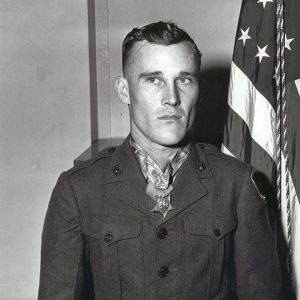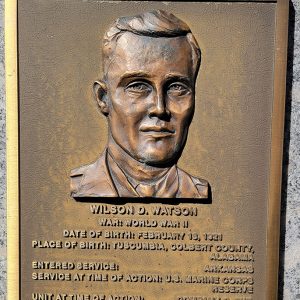calsfoundation@cals.org
Wilson Douglas Watson (1922–1994)
Wilson Douglas Watson was an Arkansas sharecropper who joined the U.S. Marine Corps during World War II and was awarded the Medal of Honor for gallantry in action during the fighting at Iwo Jima in February 1945.
Wilson Douglas Watson was born on February 16, 1922, in Tuscumbia, Alabama, to Charles Watson and Ada Belle Posey Watson. He was the oldest of five sons and two daughters, and he received a total of five years of schooling amid his labors on the farm. By 1940, the family was living in the Tyronza Township in Crittenden County, sharecropping a farm for Tom Sellers of Earle (Crittenden County).
Wilson Watson registered for the draft on June 30, 1942, and he enlisted in the U.S. Marine Corps Reserves in August 1942 and trained at a base in San Diego, California, before shipping off to the Pacific Theater on January 24, 1943, where he fought at Bougainville and Guam.
Watson was a private in Company G, Second Battalion, Ninth Marines, Third Marine Division when his unit hit the Japanese stronghold of Iwo Jima. Watson was serving as a Browning Automatic Rifle (BAR) gunner on February 26, 1945, when his squad was pinned down before a Japanese pillbox fortification. Charging the fortification alone, Watson sprayed the pillbox with BAR fire until he was close enough to throw a grenade into it. He then ran to the rear of the strongpoint, killing its Japanese defenders as they fled, allowing his platoon to take its objective.
The next day, Watson’s platoon was again pinned down by enemy fire at the base of a small hill. The young private again advanced, according to the Medal of Honor citation, scaling the rugged hill “under intense mortar and machinegun fire” until he reached the crest, firing his BAR from the hip. Watson stood exposed at the crest of the hill, firing his weapon against an onslaught of Japanese grenades and “knee mortar” (grenade launcher) fire. He “held the hill under savage fire for 15 minutes” and fired until he ran out of ammunition, killing sixty Japanese soldiers before his platoon joined him at the hill’s summit. Watson continued to fight on Iwo Jima until he was shot in the neck and evacuated from the island in March 1945, ending his involvement in the war.
Watson was awarded the Medal of Honor for his actions of February 26 and 27, 1945, with his medal citation stating: “His courageous initiative and valiant fighting spirit against devastating odds were directly responsible for the continued advance of his platoon.” President Harry S. Truman placed the Medal of Honor around his neck at a White House ceremony on October 5, 1945.
The City of Earle honored Watson with a city holiday on October 25, 1945, when all businesses were ordered closed from 1:30 to 3:30 p.m. for a parade and a program at Earle High School that included speeches by Governor Ben Laney and Congressman E. C. “Took” Gathings.
After World War II, Watson married Patricia Sullivan; the couple had a son and two daughters. After his 1946 honorable discharge from the Marines, he served in the U.S. Air Force and then the U.S. Army, including a stint in Korea during the Korean War. He retired from the army in 1966 with the rank of staff sergeant.
Watson died in Russellville (Pope County) on December 19, 1994. He is buried in Russell Cemetery in Ozone (Johnson County).
For additional information:
Medal of Honor Recipients, 1863–1978. Prepared for the Committee on Veterans Affairs United States Senate, February 14, 1979. Washington DC: Government Printing Office, 1979.
Machnitzki, Thomas R. “Wilson Douglas ‘Doug’ Watson—A Crittenden County Hero.” Evening Times (Marion, Arkansas), November 11, 2016.
Obituary of Wilson Douglas Watson. Arkansas Democrat-Gazette, December 21, 1994, 6B.
Ware, David. Beyond the Call of Duty, Arkansas Honors Its Veterans. Little Rock: Arkansas Secretary of State, 2002.
Mark K. Christ
Little Rock, Arkansas
 Military
Military World War II through the Faubus Era, 1941 through 1967
World War II through the Faubus Era, 1941 through 1967 Wilson D. Watson
Wilson D. Watson  Wilson D. Watson Plaque
Wilson D. Watson Plaque 



A brave man and a true hero–we need more like him. I have one of his Arkansas license plates.